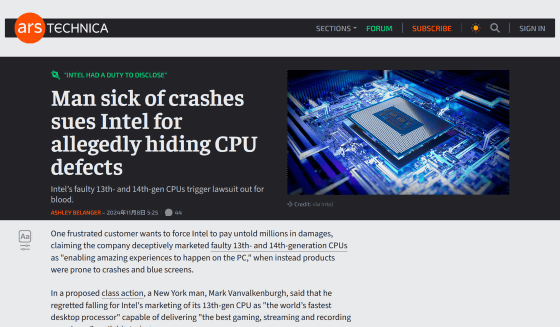Class action lawsuit filed over Intel's 13th and 14th generation Core processor crash issue

Intel's 13th generation Core processors (Raptor Lake) and 14th generation Core processors (Raptor Lake Refresh) have been
MARK VANVALKENBURGH v. INTEL CORPORATION.pdf
(PDF file) https://storage.courtlistener.com/recap/gov.uscourts.cand.438883/gov.uscourts.cand.438883.1.0.pdf
Man sick of crashes sues Intel for apparently hiding CPU defects - Ars Technica
https://arstechnica.com/tech-policy/2024/11/man-sick-of-crashes-sues-intel-for-allegedly-hiding-cpu-defects/

Intel slapped with class action lawsuit for Raptor Lake CPU instability issues — chipmaker accused of consciously selling defective chips | Tom's Hardware
https://www.tomshardware.com/pc-components/cpus/intel-slapped-with-class-action-lawsuit-for-raptor-lake-cpu-instability-issues-chipmaker-accused-of-consciously-selling-defective-chips
In July 2024, it was discovered that many users of PCs equipped with Intel's 13th and 14th generation Core processors had reported problems such as 'games crashing' and 'software not running properly.' Intel later acknowledged that there was a flaw in its design and released microcode to mitigate the problem.
Intel releases microcode for Linux to address crash issues with 13th and 14th generation Core processors - GIGAZINE

A class action lawsuit against Intel was filed on November 5th in the U.S. District Court for the Northern District of California over this processor defect issue. The plaintiff in the class action lawsuit, Mark Van Valkenburgh of New York, purchased Intel's 13th generation Core processor 'Intel Core i7-13700K' in January 2023 and experienced problems such as a sudden blackout of the screen and unexpected reboots. Van Valkenburgh claims that he tried to apply Intel's patch distributed in the summer of 2024, but was unable to resolve the malfunction.
The lawsuit states, 'After purchasing the Product, Plaintiff learned that the processor was defective, unstable and subject to a high rate of crashes. The processor caused Plaintiff's computer to experience problems, including random screen blackouts and reboots. These problems were not resolved even after Plaintiff attempted to install patches issued by Intel for its 13th Generation processors. As a result, he did not get what he paid for. If Plaintiff had known the truth about the Product, he would not have purchased the Product or would have purchased it for a lower price.'
The class action lawsuit includes users across the United States who purchased the defective processors, as well as some New York-based buyers who are seeking additional compensation. Intel claims that not all products sold were defective, so the exact number of people covered by the class action lawsuit is unclear. The plaintiffs estimate that there could be hundreds of thousands to millions of people covered, based on Intel's sales.

Van Valkenburgh argues that Intel should have known about the defects by late 2022 or early 2023, before the processors were sold. He also said that Intel should have been aware of the 'exceptionally high return rate' of the 13th Generation Core processors within months of their release, and that media reports from 2023 and 2024 confirmed customer complaints.
'Intel was obligated to disclose the processor defects because the defects were material and Intel had proprietary knowledge thereof,' the lawsuit states. 'Intel was the only company with access to those test results and monitored return rates and reported defects. Intel has proprietary knowledge of that information.'
The class action lawsuit seeks an injunction to prevent Intel from engaging in future misconduct, including misleading advertising and concealing information about defective products. It also seeks damages of up to hundreds of millions of dollars. Van Valkenburgh said Intel's fraudulent concealment was 'malicious, oppressive, willful and fraudulent,' and asked for punitive damages in an amount sufficient to deter further misconduct.

in Hardware, Posted by log1h_ik